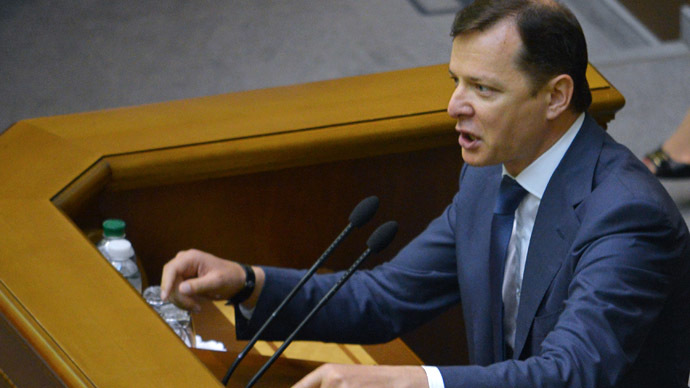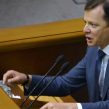
Ukraine Shows Readiness to Pay More Attention to Oppressed Groups in Russia
Publication: Eurasia Daily Monitor Volume: 11 Issue: 113
By:

On June 15, Ukrainian parliamentary deputy Oleg Lyashko initiated a bill on recognizing the Circassian genocide, citing the long period of subjugation and oppression of the Circassians by the Tsarist forces in the 18th and 19th centuries. The legislator referred to the fact that Georgia’s parliament recognized the Circassian genocide back in 2011 and set a precedent for other countries to join in. He also cited an appeal signed by Israeli activist Avrom Shmulevich, North Caucasian Circassian activists Aslan Shazzo, Almir Abregov and Elvira Kulokova, and Dagestani civil activist Magomed Avari (rpl.kiev.ua, June 15).
Lyashko is not an ordinary Ukrainian parliamentary deputy: he has played an important role in the Ukrainian government’s counter-insurgency campaign in eastern Ukraine. In Ukraine’s recent presidential elections, Lyashko came in third after the winner, Petro Poroshenko, and Yulia Tymoshenko. Given that the tensions between Ukraine and Russia are unlikely to subside soon, the Ukrainian establishment is increasingly incentivized to make use of every opportunity to counter Russia’s aggressive policies by addressing its internal cleavages. In turn, the Circassians, who receive little recognition for their grievances in Russia, are trying to seek assistance elsewhere, especially among the countries that have been antagonized by Russia.
Following long wars with the Circassians in the 18th and 19th centuries, the Russian Empire moved in decisively in the 1860s to forcibly remove the bulk of the Circassian population from their homeland in the northwestern Caucasus and the Black Sea coast. An estimated 90 percent of the Circassian population at the time was exterminated, starved or deported to the Ottoman Empire. In 1864, the process of expelling and killing Circassians ended and ethnic Russians were quickly resettled in many parts of the Circassian territory. The Russian tsars at the time considered the Black Sea coast a strategically important area that needed to be totally ethnically cleansed of all non-Russian, non-Christian groups. In contrast, the Caspian Sea, at the eastern end of the Caucasus, was not considered as important, which resulted in a very different set of policies by the Russian Empire there.
Circassian activist Andzor Kabard reiterated the Circassians’ current concerns about Russia’s inattentiveness to their problems. “Up to this very day, Russia has continued to inhibit the repatriation of the Circassians to the western and central Caucasus (historical Circassia) and does not recognize its responsibility for the current state of affairs that defines the future of the Circassian people, of the Russian Caucasus and Russia as a whole,” he said. According to Kabard, Russia has disregarded multiple appeals by various Circassian organizations and authorities in the republics that have a Circassian population. The Circassians’ main expectation of Moscow was to allow the repatriation of the descendants of the Circassians who were expelled from their homeland. Instead, in Kabard’s words, “the Russian authorities launched a large-scale propaganda campaign glorifying the Russian ‘conquistadors’ and the ‘neutralization’ of Circassians’ demands. This campaign coincided with the period of Vladimir Putin’s rule [including the presidency of Dmitry Medvedev],” he said (Adyge Heku, June 16).
The Israeli activist Avrom Shmulevich detailed his groundwork on the appeal to the Ukrainian parliament. Russian government propaganda, he said, has countered the Circassian appeals by attacking Lyashko and stressing North Caucasian involvement in the pro-Russian forces in eastern Ukraine as a way to make Ukraine less likely to consider recognizing the Circassian genocide (avrom-caucasus.livejournal.com, June 15). Indeed, the reason Russia sent “volunteers” from Chechnya and other North Caucasian republics to fight Ukraine was to spoil relations between the Ukrainian authorities and the North Caucasian liberation forces.
A pro-Moscow Circassian activist, Asker Sokht, stated that the issue of recognizing the Circassian “genocide” was an entirely domestic Russian issue, and that “dragging the Ukrainian authorities into resolving Russian issues at the time of the ongoing armed conflict and violation of human rights in Ukraine” was unacceptable. Further, Sokht alleged that, apart from a handful of individuals, no Circassian organization in Russia or abroad supports the recognition of Circassian genocide by Ukraine (Natsionalny Aktsent, June 5). Of course, Sokht conveniently “forgot” to mention the routine egregious violations of human rights in the North Caucasus by Russian forces, as well as the Circassians’ overwhelming support for Georgia’s recognition of the Circassian genocide, despite the difficult history of Georgian-Circassian relations regarding the war in Abkhazia in the 1990s. Ukrainian-Circassian relations have no recent prehistory of conflict, so the process of recognition would be even easier and would be received even more positively by the Circassians than the case of Georgia because of the Georgia-Abkhazian conflict in the early 1990s. Circassians and Abkhaz share close relations, and tensions between Sukhumi and Tbilisi created a major rift with the Circassians that ended in 2010 as a result of Georgian soft power initiatives aimed at improving relations with the Circassians and their powerful diaspora in Turkey.
On June 20, Circassian activists worldwide followed up with another appeal, this time calling on the Ukrainian government to recognize the Circassian “genocide” and stressing the similarity between Russia’s occupation of Ukraine and Circassia (cherkessia.net, June 21).
Russian pressure on Circassian activists is not limited to informational warfare. Circassian activist Andzor Akhokhov was accused of illegal possession of arms. He had previously participated in protests against the Sochi Olympics and was detained and tortured. Medical experts concluded that he received blunt chest trauma, broken ribs and head injuries (Kavkazsky Uzel, June 20).
As Russia’s relations with Ukraine reach their lowest point, the Ukrainian government is more incentivized to pay greater attention to disenfranchised groups in Russia, including the Circassians. The Russian government, in turn, is attempting to pit Ukrainians against the North Caucasians by using the latter in Russia’s strategy in eastern Ukraine that is aimed at instilling fear in the Ukrainian population with the arrival of “unruly Chechens” and other North Caucasians on the territory of Ukraine. This fear tactic used by the Kremlin has had the opposite reaction by outraging many Ukrainians and caused a sense of retribution against Moscow for its use of the North Caucasus card against the government in Kyiv.




